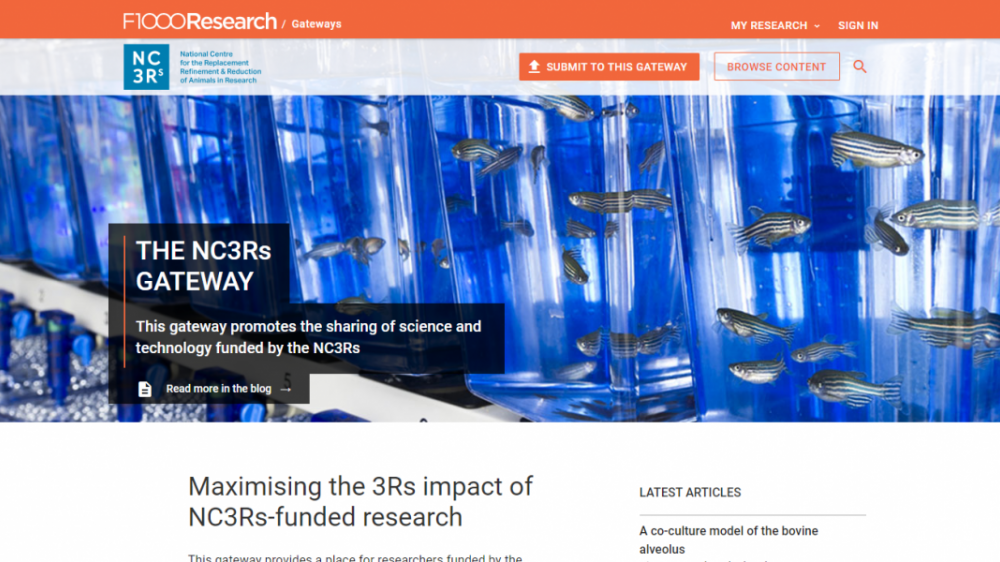The NC3Rs gateway
A dedicated, open access portal for our Grant holders to showcase their 3Rs research.
The NC3Rs gateway
About the gateway
The NC3Rs gateway is a dedicated, open access portal for our Grant holders to showcase their 3Rs research. Authors can publish the full extent of their work and methods, enabling others in the scientific community to adopt these new approaches and maximise their impacts, while addressing publication bias in the research we fund.
The gateway is hosted by F1000Research. Articles are published almost immediately, then undergo invited open peer review.
Two gateway authors and one of their reviewers talk about their experience of open peer review.
The NC3Rs Chief Executive Vicky Robinson discusses our partnership with F1000Research.
How to submit to the gateway
1. Contact the NC3Rs office
The NC3Rs gateway is open only to NC3Rs-funded researchers. To submit an article, you must contact the NC3Rs Office prior to submission.
2. Incorporate article requirements
The NC3Rs has compiled specific guidance tailored to its gateway and article type formats. NC3Rs staff will provide guidance and advice to grant holders during the drafting process to assist them in aligning their article with the NC3Rs article requirements.
F1000Research advise authors to read their post-publication peer-review model and their policies prior to submission.
3. Submit to the gateway
Articles that have been discussed with the NC3Rs Office and align with the article type requirements can be submitted directly through the NC3Rs gateway.
The NC3Rs will pay for the Article Processing Charges for up to ten articles published on the gateway each year.
Articles can be submitted as Word (DOC or DOCX) or rich text format (RTF) files only. PDF, ZIP or TeX files will not be accepted. LaTeX users can submit via Overleaf, using an F1000Research journal article template.
What article types can be published on the gateway?
The NC3Rs gateway publishes a number of different article types. The format of article types has been customised to allow the 3Rs, scientific and practical benefits of the work, as well as its current and potential applications to be effectively showcased.
The NC3Rs has compiled specific guidance tailored to its gateway and article type formats to complement the article guidelines provided by F1000Research.
Article types
Method Articles describe new and well tested experimental, observational, theoretical or computational methods or procedures, either quantitative or qualitative. This includes new study methods, substantive modifications to existing methods or innovative applications of existing methods to new models or scientific questions. We welcome technical articles that describe tools that facilitate the design or performance of experiments, provide data analysis features or assist medical treatment.
Brief Reports include single-finding papers that can be reported with one or two illustrations (figures/tables), descriptions of unexpected observations, and lab protocols. Posters from conferences or internal meetings may be summarised as Brief Reports. In many cases, some additional detail, particularly in the methods, description of the results, and/or discussion/ conclusions will be required to make sure that readers (and reviewers) have enough information to understand the description of the work.
Data Notes are brief descriptions of datasets that promote the potential reuse of research data and include details of why and how the data were created; they do not include any analyses or conclusions.
A Software Tool Article should include the rationale for the development of the tool and details of the code used for its construction. The article should provide examples of suitable input data sets and include an example of the output that can be expected from the tool and how this output should be interpreted.
Reviews should provide a balanced and comprehensive overview of the latest discoveries in a particular field.
Registered Reports are a form of empirical article in which the methods and proposed analyses are published and reviewed prior to research being conducted. This format of article seeks to address a number of inappropriate research practices, including flaws with the study design, and selective reporting of results.
Registered reports are prepared in two stages:
- Stage 1: before any data is collected, submit a Registered Report Study Protocol.
- Stage 2: once the results are available, publish a Registered Report Research Article.
Further information on Registered Reports, including guidance documents on the two stages outlined above, can be found on the F1000Research website.
Please note that Study Protocols and Research Articles will only be accepted on the NC3Rs gateway as part of a Registered Report.
Gateway FAQs
You can read a list of the most frequently asked questions about publishing on our gateway on the F1000 site.
Read the latest developments in 3Rs research.

